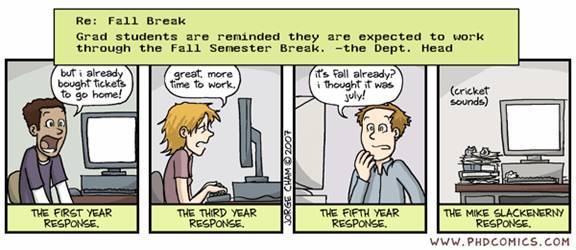Advice regarding Ph.D. Program applications from a recent Gustie grad...
Chris Rozek, continued...
Your research focus should come across in everything you turn in to your schools--your statement of purpose, any emails you send early on to professors you are interested in working with, answering the question, "What are you interested in researching here?" on a visit, etc. This will make the professor you are applying to more at ease since they will be happy to know that you are someone who not only loves research, but that you love research they are interested in, and you are motivated enough to begin planning ways to study this interest.
Another tip is to make sure you know all about what the person you are applying to has been interested in the past and, more importantly, in the present. You may be very interested in the work your potential adviser did 15 years ago, but they may have no interest in that anymore. You need to make sure to investigate what they have been publishing most recently to be sure that you still share the same interests. Also, make sure to have a, rudimentary at least, understanding of these research interests. Talking about some concepts incorrectly could not only make you sound bad in front of others, but it may be insulting to the person who has worked hard to define and research those concepts.
Those are the big things I would stress to people who are applying to get their Ph.D.s in psychology. Much of it seems like common sense, but I figured it can't help but to hear this from someone who's recently gone through the process. After you've done all the hard work applying to schools, you get to wait until you start hearing back from them and then begin visiting the schools, often in February or March. This is the time when you get to decide on the right school for you. I have a couple tips here.
Absolutely, the most important thing about choosing a school is your adviser. A really prestigious school is great for the resume, a school close to friends and family can be important as well, but your relationship with your adviser is what will determine if grad school is just a normal sometimes pain-filled and arduous path to success or if it is a terror-filled road of horrors that ends in transfer or quitting. I would spend my time figuring out as much as possible about your future adviser from the grad students who currently have the professor as an adviser, other grad students in the department who know the professor, and anyone else you can find who has an opinion. It's good to have an idea of your potential adviser's quirks (they all will have them), working style, and level of productivity. To this last point, it is good to know if this person is actively still doing research on their own and you will be helping them work on various projects or if you will mostly be conducting research within their lab that you come up with and their input is more about advice and trouble-shooting. The level of involvement and control in research differs considerably from professor to professor, and this is helpful to know so your expectations match their specific style. Something I never thought about before applying is that it would probably be useful to look up someone who is widely known for doing research in a topic you enjoy. This person is probably well known within the field and slightly older. Next, find out what schools this person's previous graduate students who are now professors are working at. This will help you figure out more schools to apply to, and if you can get in on the ground floor with a young professor who is working on getting tenure, there are certain advantages. As your adviser, this person, probably, won't yet be as set in their ways, and they will be doing everything in their power to publish as much research as they can. This may make for some more stressful times for you, but you know that they will be highly productive. A well-established adviser will have a more set style, but there are advantages to having an adviser with more experience as well.
Those are just a few tips I have after being on both sides of the process these last couple years, and this advice, certainly, will not apply to all situations. Mainly, these are just some of the things I would advise people to pay attention to while going through the process. That being said, I'm enjoying my time at the University of Wisconsin-Madison, and I love the classes I'm taking and the research I'm doing! I'm lucky to be around some of the most intelligent and thoughtful people I could have gotten to be stuck with in my time in grad school, and I'm really happy being here with my lab and adviser. If any of you have questions about psych grad school, especially the big research-intensive Ph.D. program types, let me know! I'd be more than happy to answer any questions people have...
One more thing--here’s a little example of grad school life from phdcomics.com for any of you thinking about applying:
